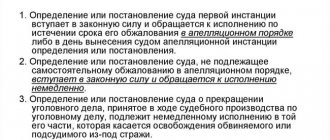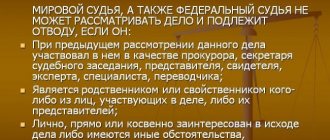1. After signing the verdict, the court returns to the courtroom and the presiding judge announces the verdict. Everyone present in the courtroom, including the court panel, listens to the verdict while standing.
2. If the sentence is stated in a language that the defendant does not speak, then the translator translates the sentence out loud into a language that the defendant speaks, synchronously with the proclamation of the sentence or after its proclamation.
3. If the defendant is sentenced to death, the presiding judge explains to him the right to apply for pardon.
4. If only the introductory and operative parts of the sentence are announced in accordance with part seven of Article 241 of this Code, the court explains to the participants in the trial the procedure for familiarizing themselves with its full text.
5. The judge’s special opinion must be issued no later than 5 days from the day the verdict was announced. The special opinion of the judge is attached to the verdict and is not subject to announcement in the courtroom. When pronouncing the verdict, the presiding judge announces the existence of a dissenting opinion of the judge and explains to the participants in the trial the right, within 3 days, to file a petition for familiarization with the dissenting opinion of the judge and the period for such familiarization.
6. A convicted person, an acquitted person, their defense attorneys, legal representatives, a prosecutor, a victim, his representative have the right to submit a petition for familiarization with the special opinion of a judge, and if the special opinion of a judge is related to the resolution of a civil claim, a civil defendant, a civil plaintiff and their representatives.
The verdict is an act of justice
A verdict is a decision on the innocence or guilt of the defendant and the imposition of punishment on him or on his release from punishment, made by a court of first or appellate instances (clause 28 of Article 5 of the Code of Criminal Procedure of the Russian Federation).
The verdict of any Russian court, including the verdict of a magistrate, unlike other court decisions, is decided not on behalf of the judge, but in the name of the Russian Federation (Article 296 of the Code of Criminal Procedure of the Russian Federation).
This approach to sentencing is due to the fact that the state, by giving the judiciary the right to consider a criminal case on its merits, assumes responsibility for the legal, reasonable and fair resolution of the criminal case.
In this regard, the state makes special demands on the sentence and its properties, the criminal procedural procedure for its ruling and proclamation.
The court's verdict must be legal, reasonable, motivated and fair.
A sentence is recognized as legal, reasonable and fair if it is passed in accordance with the requirements of international acts, criminal procedure law and is based on the correct application of the criminal law (Article 297).
The legality of the sentence is the compliance of the order of the decision, the form and content of the sentence with the generally recognized principles and norms of international law, the norms of criminal procedure and other legislation to be applied in the framework of a specific criminal case, as well as the correct application of the criminal law.
The validity of the verdict - compliance:
a) the factual circumstances of the crime established by the court or judge, taking into account the rules for their assessment; b) the court’s conclusions regarding the factual circumstances of the case that took place in reality.
The motivation of a court verdict is confirmation of the conclusions and orders (or decisions) of the court with factual and legal arguments.
The fairness of a sentence is a social and moral characteristic of the content of a sentence, which consists in its compliance with the moral views of society, but primarily of the participants in the trial of a particular criminal case.
In relation to a legal, reasonable, motivated and fair verdict, there is a presumption of its truth.
This presumption is rebuttable in the theory of criminal procedure and in criminal procedural legislation.
In this regard, the reversal of a sentence is allowed only on the grounds, conditions, within the limits and in the manner specified in the criminal procedure law.
The verdict has significant social and legal significance.
Firstly, the verdict, summing up the activities of the preliminary investigation bodies and the courts of first or appellate instances, acts as the only criminal procedural document by which the defendant can be found guilty of committing a crime with all the ensuing social and legal consequences (legal restrictions).
Secondly, a court verdict ensures the protection of the rights, freedoms and legitimate interests of not only the defendant, but also all participants in criminal proceedings.
Thirdly, an acquittal plays the role of a criminal procedural means of rehabilitation of persons who were illegally, unreasonably or unfairly placed in the position of defendants.
Fourthly, the verdict expresses the social and legal assessment of the social danger (gravity) of the crime and the person who committed it.
Fifthly, just (i.e. legal, justified, motivated and fair) court sentences form the proper legal consciousness of the population in any society, provide an educational and preventive impact on citizens in terms of their law-abiding behavior, and strengthen the population’s confidence in the fairness of domestic justice.
In accordance with Art. 302 of the Code of Criminal Procedure of the Russian Federation, a court verdict can be guilty or acquittal.
The basis for a guilty verdict is the totality of reliable evidence examined in court proceedings, sufficient for an unambiguous conclusion about the presence of:
a) the events of the crime; b) signs of a crime in this event (act); c) the defendant’s guilt in committing a crime.
A conviction cannot be based on assumptions, and all unremovable or unremovable doubts shall be interpreted only in favor of the defendant.
In this case, irremovable doubts may concern not only the question of the defendant’s guilt as a whole, but also individual episodes of the charge brought, the form of guilt, the degree and nature of participation in the commission of the crime, mitigating and aggravating circumstances for the defendant’s punishment, etc.
The basis for an acquittal is the totality of evidence examined during the trial:
a) sufficient for an unambiguous conclusion about the existence of grounds for acquitting the defendant (proven innocence); b) insufficient to establish a conclusion about the participation of the defendant in the commission of a crime (unproven guilt).
In any case, proven innocence or unproven guilt equally rehabilitates the defendant, although the grounds for acquittal in various ways entail legal consequences for the protection of subsequent (in particular, civil law) interests of the acquitted defendant.
Convictions, depending on the court’s decision on the issues of punishment and its serving, are divided into three subtypes:
1) a conviction with the imposition of a sentence to be served by the convicted person.
In this verdict, the court must accurately determine the type of punishment, its size, regime and the beginning of the calculation of the term of serving the sentence;
2) a conviction with the imposition of a sentence and release from serving it.
This sentence is pronounced if, at the time of its decision and announcement:
a) an act of amnesty was issued by the State Duma of the Federal Assembly of the Russian Federation, exempting the convicted person from the punishment imposed by this verdict; b) the time the defendant was in custody in this criminal case, taking into account the rules established by Art. 72 of the Criminal Code of the Russian Federation, absorbs the punishment imposed on the defendant by the court;
3) or if a conviction is made without sentencing.
If the grounds for termination of the criminal case and (or) criminal prosecution specified in paragraphs 1-3 of Part 1 of Art. 24 and paragraphs 1 and 3, part 1, art. 27 of the Code of Criminal Procedure of the Russian Federation are discovered during the trial, the court continues to consider the criminal case in the usual manner until it is resolved on the merits.
In the cases provided for in paragraphs 1 and 2 of Part 1 of Art. 24 and paragraphs 1 and 2, part 1, art. 27, the court rules an acquittal (Part 8 of Article 302 of the Code of Criminal Procedure of the Russian Federation).
In cases provided for in clause 3, part 1, art. 24 and paragraph 3, part 1, art. 27, the court makes a guilty verdict with the release of the convicted person from punishment (Part 8 of Article 302).
Depending on the grounds for acquittal, acquittals are divided into the following subtypes:
- a sentence passed in the absence of a crime event (the crime event has not been established);
- a sentence imposed due to the absence of corpus delicti in the act;
- a sentence imposed due to the lack of proof of the defendant’s participation in the commission of a crime (the defendant was not involved in the commission of the crime);
- a verdict rendered on the basis of a jury's acquittal verdict against the defendant.
Acquittal on any of these grounds means the recognition of the defendant as innocent and entails his rehabilitation in the manner established by Chapter 18 of the Code of Criminal Procedure of the Russian Federation.
Defender of the general and lawyer from Abakan
400 hours of compulsory work - such a punishment under Article 310 was imposed in February 2015 by the magistrate of precinct No. 7 of the city of Abakan Tatyana Kanzychakova. The defendant is lawyer Vladimir Dvoryak, who defended the former head of the personnel department of the Ministry of Emergency Situations of Khakassia, Vyacheslav Titov. The nobleman photographed the interrogation protocols that were read out in court, where the issue of Titov’s arrest was being decided, and in his office he showed them to people not participating in the process - in particular, the head of the Ministry of Emergency Situations of the republic, Andrei Firsov. These materials proved the fact that his client was forced to testify by a high-ranking employee of the Khakassia FSB Directorate and the investigator, the lawyer insisted.
As soon as a case was opened against Dvoryak, he was removed from Titov’s defense. “The pre-investigation check does not limit the lawyer’s work in any way. A conviction is grounds for termination of status. But a criminal case in itself is not a basis for removal from the case, but the investigator can remove the lawyer due to a conflict of interest,” explains lawyer Pavlov.
A letter in support of lawyer Dvoryak was signed by more than 40 lawyers of Khakassia, including the president of the Republican Chamber of Lawyers, Alexander Marushan. Complaints against Dvoryak’s sentence were sent by his colleagues from different regions, but he survived both the appeal and cassation instances.
In April 2014, the lawyer of the young Major General of the Ministry of Internal Affairs Boris Kolesnikov, who was arrested along with his boss, Lieutenant General Denis Sugrobov, Georgy Antonov held a press conference. As journalists later testified in court, they did not learn anything fundamentally new from Antonov - what he said was rather a commentary on the plot of the charges brought against Kolesnikov and his accomplices. But less than a month passed, the lawyer was removed from defending a high-ranking employee of the Ministry of Internal Affairs, and a criminal case was opened against him under Article 310.
In April 2015, the magistrate of precinct No. 100 of the Zamoskvoretsky district of Moscow found Antonov guilty and sentenced him to a fine of 65 thousand rubles, immediately amnestied him and released him from punishment. The lawyer tried to appeal the verdict, but was unsuccessful.
The procedure for deciding and pronouncing a verdict
Taking into account the social and legal significance of the sentence, the need to ensure the independence of judges and create optimal conditions for pronouncing any sentence, the domestic legislator has provided for a special procedure for its ruling and proclamation.
To ensure the secrecy of the procedure for pronouncing a sentence by a single judge or a conference of judges, the sentence is pronounced in the deliberation room.
When a verdict is passed, only judges who are members of the court in the given criminal case may be in the deliberation room.
The presence of other persons (prosecutor, defense attorney, etc.) in the deliberation room is not allowed.
At the end of working hours, as well as during the working day, judges have the right to take a rest break by leaving the deliberation room.
However, they do not have the right to communicate with anyone regarding the materials of the criminal case.
Judges cannot disclose judgments that took place during a meeting, discussion of issues resolved in the deliberation room and rendering a verdict (Article 298 of the Code of Criminal Procedure of the Russian Federation).
When rendering a verdict, the court (or judge) in the deliberation room resolves the issues specified in Art. 299 and 300.
In the deliberation room, first of all, the issues listed in Art. 299 and presented generally in a logical sequence.
When rendering a verdict, the court or judge in the deliberation room resolves the following issues:
1) whether it has been proven that the act of which the defendant is accused took place;
2) whether it has been proven that the defendant committed this act;
3) whether this act is a crime, and if so, what paragraph, part, article of the Criminal Code of the Russian Federation provides for it;
4) whether the defendant is guilty of committing this crime. A positive answer presupposes proof of the commission of the act by the defendant, which means that the act is the result of the actions or inaction of the defendant;
5) whether the defendant is subject to punishment for the crime he committed;
6) whether there are circumstances mitigating or aggravating the punishment;
7) what punishment should be imposed on the defendant;
whether there are grounds for a guilty verdict without imposing punishment or exemption from punishment;
9) what type of correctional institution and regime should be determined for the defendant when assigning him a sentence of imprisonment;
10) whether the civil claim filed in criminal proceedings is subject to satisfaction, in whose favor and in what amount;
10.1) whether it has been proven that the property subject to confiscation was obtained as a result of the commission of a crime or is the proceeds of this property or was used or intended to be used as an instrument of crime or for the financing of terrorism, an organized group, an illegal armed group, a criminal community (criminal organization) ;
11) what to do with property that has been seized to secure a civil claim, other property penalties or possible confiscation;
12) how to deal with material evidence available in a criminal case;
13) to which of the participants in criminal proceedings and in what amount should criminal procedural costs be imposed;
14) whether the court or judge in the cases provided for in Art. 48 of the Criminal Code of the Russian Federation, deprive the defendant of a special, military or honorary title, class rank, as well as state awards;
15) whether compulsory measures of educational influence can be applied in the cases provided for in Art. 90 and 91 of the Criminal Code of the Russian Federation;
16) whether compulsory measures of a medical nature can be applied in cases provided for in Art. 99 of the Criminal Code of the Russian Federation.
According to Art. 300 of the Code of Criminal Procedure of the Russian Federation, the court is obliged to discuss the issue of the defendant’s sanity if it arose during the preliminary investigation or trial.
Having recognized that the defendant was in a state of insanity at the time of committing a socially dangerous act, or that the defendant developed a mental disorder after committing the crime, depriving him of the ability to realize the actual nature and social danger of his actions (inaction) or to direct them, the court makes a decision to apply compulsory punishment to him. medical measures in the manner established by Chapter 51 of the Code of Criminal Procedure of the Russian Federation;
17) whether the preventive measure against the defendant should be canceled or changed.
If the defendant is accused of committing several crimes, then the court resolves the issues specified in paragraphs 1-7 of Part 1 of Art. 299 of the Code of Criminal Procedure of the Russian Federation, for each crime separately.
If several defendants are accused of committing a crime, then the court resolves these issues provided for in paragraphs 1-7 of Part 1 of Art. 299, in relation to each defendant individually, determining the role and degree of his participation in the committed act.
The procedure for the conference of judges during the collegial consideration and resolution of a criminal case is regulated by Art. 301 Code of Criminal Procedure of the Russian Federation.
When rendering a verdict, if the criminal case was considered by the court collectively, the presiding officer raises issues for consideration and resolution in the manner established by Art. 299.
When resolving each issue, judges do not have the right to abstain from voting, except for the cases provided for in Part 3. 301.
All issues are resolved by a simple majority vote of the judges.
The presiding judge, as the most experienced judge on the panel, votes last.
According to Part 3 of Art. 301 judges who voted for an acquittal and remained in the minority are given the right to abstain from voting on issues of application of criminal law.
If the opinions of judges on the issues of classifying a crime or applying a penalty differ, then the vote of the judge cast for acquitting the defendant is added to the vote of the judge cast for classifying the criminal act under a criminal law that provides for a less serious crime, and for imposing a less severe punishment.
The death penalty can be imposed on a guilty person only by unanimous decision of all judges.
The judge who has a dissenting opinion on the verdict has the right to state it in writing in the deliberation room.
The dissenting opinion is attached to the criminal case (sentence), but is not subject to announcement in the courtroom.
In accordance with Art. 303 court, resolving all the issues specified in Art. 299 and 300, proceeds to drafting the verdict, which must be stated in clear, understandable terms, in the language in which the trial was conducted.
The verdict must be handwritten by one of the judges participating in its decision, or produced using technical means.
The verdict must be signed by all judges, including the judge who retains his (dissenting) opinion.
Corrections to the verdict must be stipulated and the reservations signed by all judges in the deliberation room before the verdict is announced.
After signing the verdict, the court returns to the courtroom (trial) and the presiding judge announces the verdict.
Everyone present in the courtroom, including the court panel, listens to the verdict while standing.
If the sentence is stated in a language that the defendant does not speak, then the translator translates the sentence out loud into a language that the defendant speaks, synchronously with the proclamation of the sentence or after its proclamation.
If the defendant is sentenced to death, the presiding judge explains to him the right to apply for clemency.
If only the introductory and operative parts of the verdict are announced at a court hearing, the presiding judge explains to the participants in the trial the procedure for familiarizing themselves with its full text (Article 310 of the Code of Criminal Procedure of the Russian Federation).
After pronouncing the verdict, the court, in cases specified in the criminal procedure law, must resolve the issue of releasing the defendant from custody.
In accordance with Art. 311 of the Code of Criminal Procedure of the Russian Federation, a defendant in custody is subject to immediate release in the courtroom in cases where:
- acquittal;
- conviction without imposition of punishment;
- a guilty verdict with the imposition of a sentence and release from serving it;
- a guilty verdict with the imposition of a non-custodial sentence or a suspended sentence.
Within five days from the date of pronouncement of the verdict, copies of it must be handed to the defendant (convicted or acquitted), his defense lawyer and the prosecutor.
Within the same period, copies of the verdict can be handed over to the victim, civil plaintiff, civil defendant and their representatives if there is a petition from these persons (Article 312 of the Code of Criminal Procedure of the Russian Federation).
Simultaneously with the verdict, the court may also resolve the following issues.
If a person sentenced to imprisonment has minor children, other dependents, as well as elderly parents in need of outside and constant care, the court, simultaneously with the verdict of guilty, issues a ruling, and the judge makes a decision on the transfer of these persons to the care of close relatives, relatives or others. persons or placing them, respectively, in children's or other social institutions.
If the convicted person has property or a home that remains unattended, the court issues a ruling, and the judge issues a ruling on taking measures to protect them.
If an appointed defense attorney participates in criminal proceedings, the court, simultaneously with the sentencing, makes a ruling, and the judge, a ruling on the amount of remuneration to be paid for providing legal assistance to the defendant.
All of the above decisions can be made at the request of interested parties and after the verdict is announced (Article 313 of the Code of Criminal Procedure of the Russian Federation).





